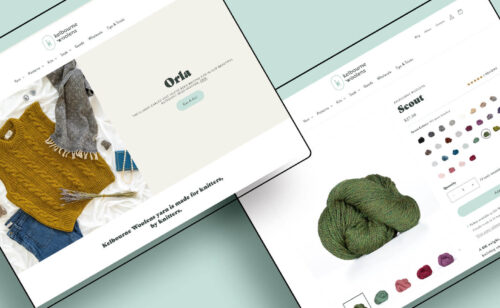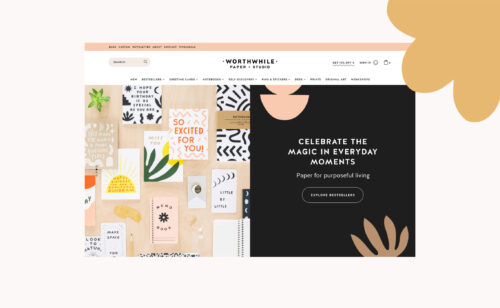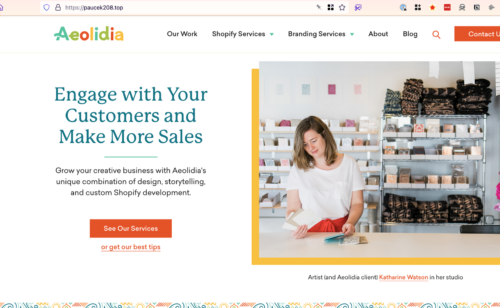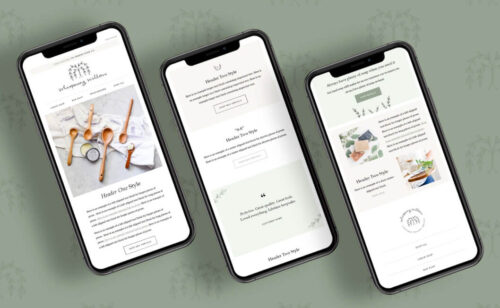
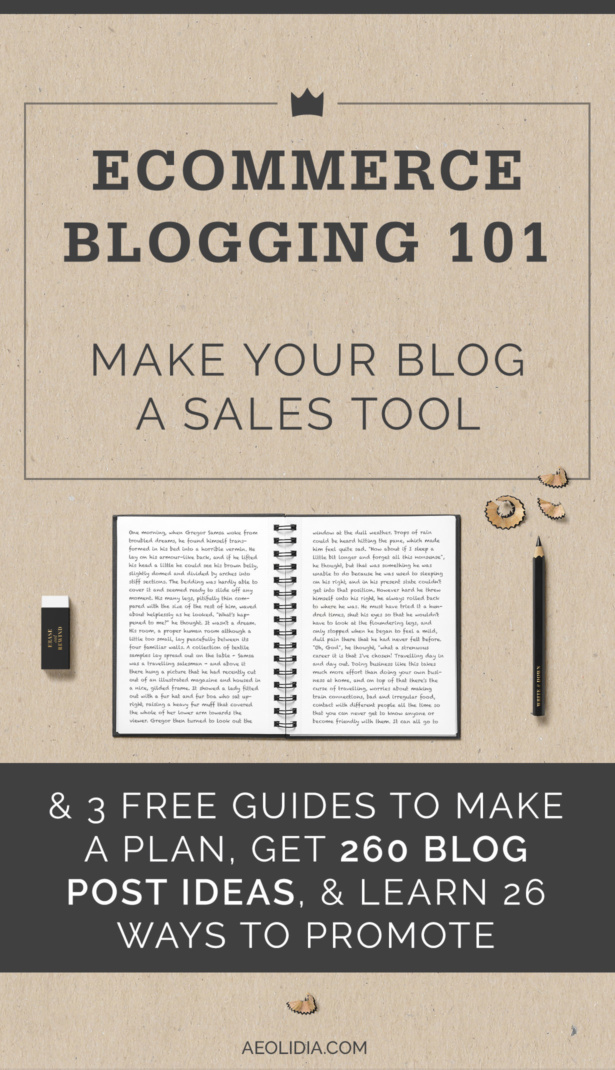
This Blogging 101 article was originally posted on Tradeshow Bootcamp, and updated to include more information about promoting your blog posts.
Katie of Tradeshow Bootcamp invited me to share some information on best practices for blogging with you, and I was glad to provide an overview. Our blog posts about blogging have received a huge amount of interest, and are a great start for businesses new to blogging, or who want to improve what they’ve been doing.
I spoke last spring to a group of creative businesses about creating a website content strategy. I showed some example websites from our portfolio that had very well-organized, goal-based navigation, and then during the Q&A time, someone asked me, “I noticed that all the sites you showed us had a blog. Do I need a blog for my business?” We talked about that briefly as a group, and when we chatted in person later, she thanked me for the insight and confessed to me that she didn’t have any idea that blogs drove traffic to a website, but instead thought that blogs were, “just something women liked to do.” This really surprised me, and I made a note to tackle this topic on our blog.
So, if you think that women business owners are blogging because they’re chatty and enjoy sharing their lives, think again. These women (and men, of course!), are strategically driving traffic to their websites, enjoying tons of love from Google, and making their other marketing efforts easier. Let me explain how.
What is a blog?
A blog is part of a website that displays articles. Your articles (or blog posts) are usually updated on an ongoing basis, listed in chronological order on your blog, and show dates of posts and an area for people to comment. Some websites are blogs (you go to the main page and see the posts), and some websites contain many pages, with a blog being one of the pages on the site.
Is blogging dead?
You may have heard one person or another say that blogging is “dead,” and that you shouldn’t be expending energy there. What these people are talking about is blogging as a business model. The kind of blog where you share what’s going on in your life, inspirational content, and interesting links, and try to make money off of advertising.
What you are trying to do is run a successful ecommerce business, and support your marketing efforts with blogging. That kind of blogging is not going anywhere. People have not stopped reading blogs (you’re reading this one! And think about all of those links you click on Twiter and Facebook – most of those are to blog posts), but it’s become harder to make money off of blogging if that’s your entire business.
You aren’t trying to make money from the articles you write, but instead you’re using those articles to direct readers to your shop.
What about social media instead?
I see a lot of people replacing blogging with social media – posts on Instagram and Facebook, for instance. This is good in addition to blogging, but you can’t put all of your eggs in a basket you’re not in control of. Your blog isn’t going anywhere. Facebook made changes that nearly killed it for small businesses.
People who were used to posting content to Facebook and having most of their audience see it and be able to interact with it were surprised when algorithm changes made it so less than 2% of their audience was reacting to what they posted. Instagram is enjoying a heyday, but guess what? It’s owned by Facebook, and I’m sure you’ve seen promoted posts showing up in your feed. Things could change at any time.
Absolutely post on social media. But if Instagram is bringing you 60% of your traffic, what will you do if they stop letting people see your posts? Or make it pay to play?
Use social media to bring people back to your blog and your website, which is where you want them. Get them to subscribe to your email list, where you can be in touch one on one with them. Keep your eggs in your own basket.
Why should I have a blog?
A blog can:
- bring traffic to your site
- be good for Search Engine Optimization (SEO)
- establish you as an authority
- make your other marketing efforts easier
- humanize your brand
- drive sales
For a detailed discussion of all six of these topics, see: Do I Need a Blog For My Business?
What if I don’t want to blog?
There are plenty of other ways to drive traffic to your site without a blog, and if you don’t have the time or the talent (or the money to hire someone) to start a blog now, it is fine to concentrate on other ways to bring people to your website and keep them engaged.
Is this you?
- I don’t have time to blog
- I’m not a good writer
- I don’t know what to blog about
- I feel like I have to blog, but I don’t want to!
The thing about blogging is that it’s not going to work for you if it’s halfhearted or grudgingly written. If you’re not interested in it, your content won’t be inspired, valuable, entertaining, or unique. People won’t stick around. Having a good-quality blog is going to be a huge boost for your business. Having a sporadically-updated mediocre blog is only going to waste your time. Time which you could be using to market your business in another way.
If you’d prefer not to blog, here are my recommendations for marketing your ecommerce site: What to Do if You Don’t Want to Blog
Coming up with ideas for a blog
If you have decided that you will start a blog or a newsletter, or you’d like some more ideas for an existing blog or social media, I’ve come up with a big list for you.
Ensure that you’re not stuck facing a deadline with no idea what to post about. This guide will give you 260 blog post ideas (which you could also use for your newsletter or Instagram), introduce you to 9 ecommerce blogs that are absolutely killing it, and give you an action plan for generating more ideas of your own and getting started. Some of these are sure to spark an idea in you!
My follow-up post, 5 Places to Find Blog Post Ideas on Your Own Site shares the method I used to think of this many ideas so quickly.
Making a foolproof plan for your blog
If you’ve decided a blog is an important way to build your business, you will need a solid plan to ensure that you’re posting the right content at the right time, keep ahead of the game, and stay focused. My post, 6 Important Steps to Plan a Blog for Your Business, will lead you through creating an editorial calendar and sticking with it.
Promoting each post on your blog
I really hope you aren’t just writing and writing with no one reading. So! You got your blog up and running, you decided on a schedule, you filled your editorial calendar with post ideas, you started writing and publishing and yet… it doesn’t feel like the blog is working. It’s not bringing you traffic, no one is commenting, and certainly nothing you’ve done has gone viral! Guess what? You may be talking to yourself.
My post, 26 Ways to Make More Sales by Blogging For Your Online Shop, will show you how to promote each post to get sales. Or just skip ahead to the freebie below.
What else do you wonder about?
If you’re planning to start a blog, or have recently started a blog, what is giving you the most trouble? I’d love to offer some advice in the comments.
260 Blog Post Ideas for E-Commerce Businesses
In this downloadable PDF, I’ve put together 260 blog post ideas (which you could also use for your newsletter or Instagram), introduce you to 9 ecommerce blogs that are absolutely killing it, and give you an action plan for generating more ideas of your own and getting started.
Get your 260 blog post ideas PDF here:

Browse Posts
A Newsletter That Goes Beyond Shopify 101
It’s easy to find beginner info about ecommerce online. If you’re past that? Subscribe to our newsletter for advanced strategies and need-to-know info for established shops.
Learn how the top shops grow:
"*" indicates required fields
Related Posts
Let's take your online shop to the next level
The Shopify websites we design have a reputation for substantial improvements to ecommerce conversion rates and online sales. Let's talk!
 Grab my guide to the 10 main ways to grow traffic and optimize to boost sales.
Grab my guide to the 10 main ways to grow traffic and optimize to boost sales.